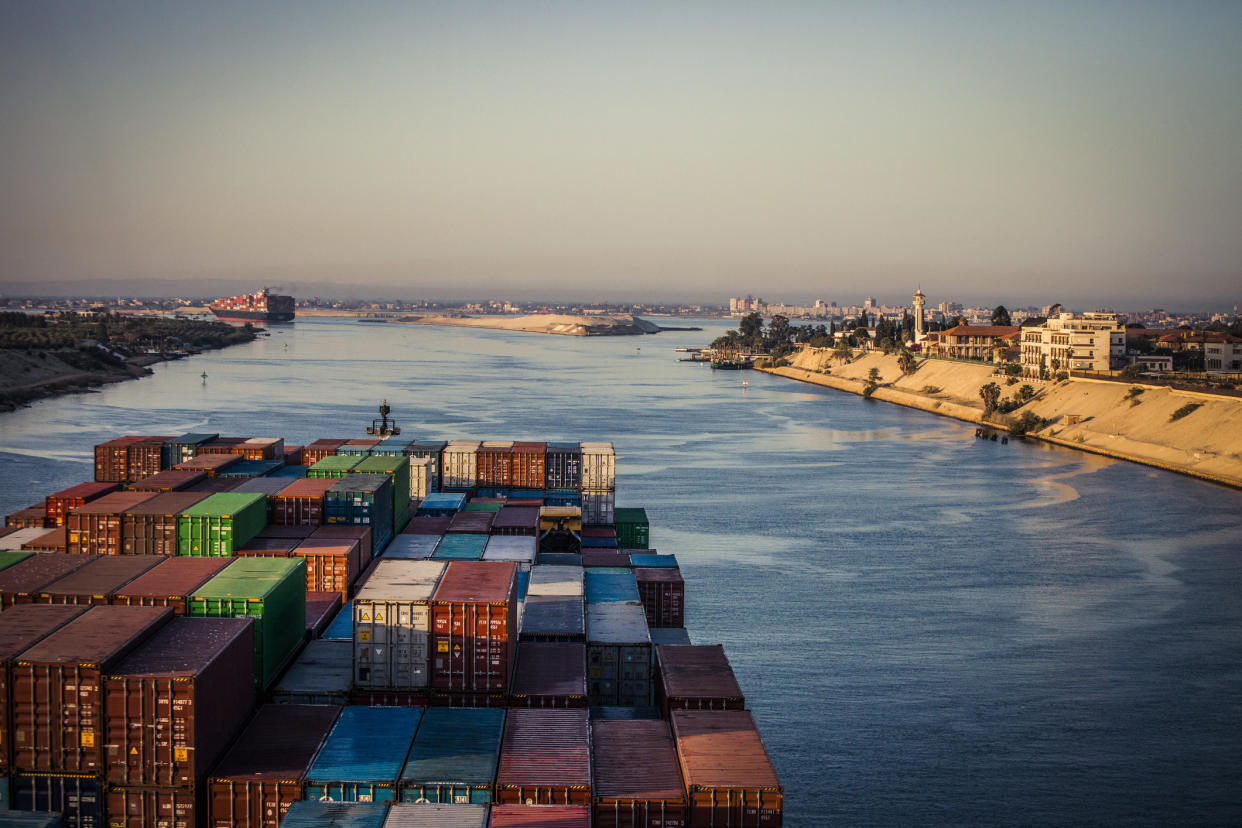How the Israel-Hamas conflict threatens the Suez Canal

There isn’t as much traffic flowing through the Suez Canal these days. No, the infamous Ever Given isn't blocking the canal again. Instead, "the shipping industry has been unable to avoid getting sucked into geopolitical tensions around the Israel-Hamas war," CNBC reported. Much of the world's trade flows through the canal and the Red Sea: That route runs through Egypt — and Egypt borders Israel.
And Iranian-backed Houthi militants have vowed to attack ships headed to Israel.
The resulting attacks have "prompted several shipping companies to divert vessels" from the region, Reuters reported. BP, for example, said Monday it is pausing its oil shipments through the Red Sea. And that has ripple effects on global trade: Changing the routes that ships travel — longer journeys that avoid the Red Sea and Suez Canal — to their destinations "adds cost and time to vessel journeys." As a result, oil prices and war insurance premiums have "spiked."
That's why the U.S. announced Monday it is forming a multinational task force to protect shipping through the Red Sea to and from the canal, The New York Times reported. Defense Secretary Lloyd Austin said the Houthi attacks threaten "the free flow of commerce, endangers innocent mariners, and violates international law." About 12 percent of world trade goes through the Suez Canal. Will the new U.S.-led task force return normalcy to the shipping lanes?
A new supply chain crisis?
"A new Suez crisis threatens the world economy," The Economist argued. In the last week, four of the world's biggest shipping companies — CMA CGM, Hapag-Lloyd, Maersk and MSC — have paused operations in the Red Sea, "the route through which traffic from the Suez Canal must pass," because of the Houthi attacks. The crisis even affects ships that have nothing to do with Israel: "One of the vessels attacked by the Houthis was sailing under a Hong Kong flag."
Some shipping companies are re-routing traffic from Asia to Europe around the southern tip of Africa, The Loadstar reported. That adds 10 days to the trip, and could throw the supply chain into a new crisis causing the "bunching of ships at ports, landside congestion and shortages of equipment." Memories of the Ever Given loom large over the current crisis. "Let's not forget what happened two years ago," said one expert.
Consumers around the world will feel the effects as the cost of shipping and oil prices continue to rise, The Wall Street Journal reported. "All you know is it is going to cause chaos, and everything is going to get a lot more expensive," said Richard Matthews at E.A. Gibson Shipbrokers. The new task force will help that situation, said another observer, but only so much: "It will make passages slow significantly but it will be much safer."
'The resilience of global trade'
The irony? The Suez Canal had been experiencing a "renaissance," The Maritime Executive reported. That's partly because the Panama Canal — a whole ocean away — "is suffering from the worst drought conditions in 73 years." That has forced authorities in Panama to reduce the amount of traffic traversing its locks to and from the Atlantic and Pacific oceans. The Suez Canal, meanwhile "has so far been unaffected by climate change." And it had become the beneficiary of traffic rerouted from Panama.
Now the "simultaneous disruption in the Panama and Suez canals" together threatens supply chains around the world, the Financial Times reported. The twin crises have "highlighted bigger questions about the resilience of global trade" and are forcing officials to consider alternatives. "Government and business need to be looking at what a resilient supply chain looks like," said Marco Forgione, director-general of the Institute of Export and International Trade.
The U.S. can't make it rain in Panama. But it will — along with nine other countries — try to ensure the Suez Canal remains open to traffic. "This is an international challenge that demands collective action," Austin said Monday during his announcement of the task force.

